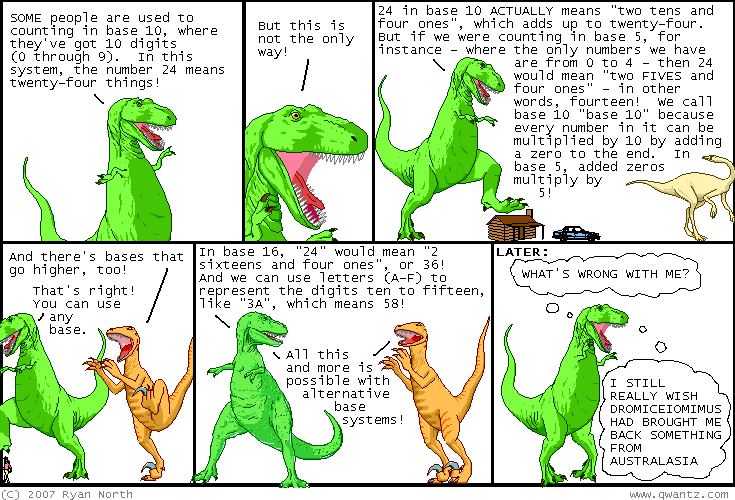
One of the things I see sporadically is mention of numbers being written
in base 10
, as if this meant anything. Think for a little while and
you'll see that, if I say I'm writing numbers in base 10
, I haven't told
you what number-base I'm using. I have told you that I'm denoting numbers using
sequences of digits in some base – but, whatever base I'm
using, 10
is simply the denotation for the number I'm using as my
base. If you're going to entertain, by discussing which base you're using, the
possibility that you might not be using the default base your culture uses, you
should read sequences of digits out as such: read base 10
as base one
zero
and it'd be easier to realize why it means base the number-base
I'm using
. It's like a sign telling you You are here
–
doubtless true, but utterly useless.
If I'm writing in base seventeen, then seventeen is written 10, two hundred
and eighty-nine is written 100 and these are pronounced one zero
and one zero zero
; the latter is not pronounced one hundred
, since
one hundred is written 5f
(if we use the letters a through g for the
digits denoting ten through sixteen, variously; this matches a common idiom in
how computer programs represent numbers in bases larger than ten). If I'm
writing in base two hundred and fifty-six then two-hundred and fifty-six is
written 10 (and you may have problems coming up with suitable characters to
represent the last few dozen digits). If I'm writing in base two, then two is
written 10. (There are 10 kinds of people in this world: those who grok binary
and those who don't.) It doesn't matter what base I use, I'm always writing in
base 10.
What folk mean, when they imagine that base 10
means anything, is
usually that they're writing in base ten. Unfortunately, they're presuming that
I know to read a sequence of digits in base ten to know that one zero
means ten, so that I can infer that what they mean is that they're writing in
base ten. But what they've actually written doesn't tell me that – it
just relies on a default assumption that I would have made anyway, if they'd
simply not wasted their time trying (and failing) to tell me what base they were
using. Forcing me to guess what base you're using in order to make sense of
your attempt to tell me what base you're using is a waste of time.
If you want to say what base you're using, use words: trying to use a digit sequence to denote the number you're using just complicates the situation with the issue of what base should be used to read the digit sequence !
On a related note, pronouncing a time, such as 07:00, as oh seven hundred
hours
is stupid and broken. First off, that oh
is both superfluous
and wrong: it's a zero, not the letter between N and P in the western alphabet;
and you don't need to mention it because the time is seven. If you want to be
really specific, its exactly seven; if you want to be sure no-one thinks you're
using a twelve-hour clock so might mean nineteen, say seven aye emm
. In
any case, the 00 after the colon doesn't denote hundred
–
it denotes sixty, due to the peculiarities of how we denote times – and if
you're going to mention it, you're specifying time to the minute, so
call it seven o'clock and no minutes or, if you really insist on mentioning
every digit, zero seven hours and zero zero minutes
.

 Written by Eddy.
Written by Eddy.